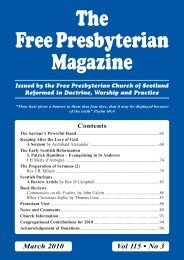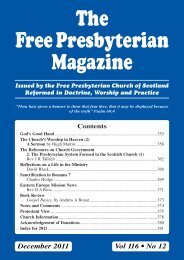February - the Free Presbyterian church of Scotland
February - the Free Presbyterian church of Scotland
February - the Free Presbyterian church of Scotland
Create successful ePaper yourself
Turn your PDF publications into a flip-book with our unique Google optimized e-Paper software.
The Great Ejection <strong>of</strong> 1662 53<br />
any scruple upon his spirit. In which, when he saw <strong>the</strong>se clauses [in <strong>the</strong> Act]<br />
<strong>of</strong> assent and consent, and renouncing <strong>the</strong> Covenant, he was fully satisfied<br />
[about his duty].<br />
“But he seemed so moderate before that both myself and o<strong>the</strong>rs thought<br />
he would have conformed: he <strong>of</strong>ten saying he would not leave his work for<br />
small and dubious matters. But seeing his way so plain for quitting <strong>the</strong><br />
public station that he held, and being thoroughly persuaded <strong>of</strong> this, that <strong>the</strong><br />
ejection <strong>of</strong> <strong>the</strong> ministers out <strong>of</strong> <strong>the</strong>ir places did not disoblige <strong>the</strong>m from<br />
preaching <strong>the</strong> gospel, he presently took up a firm resolution to go on with his<br />
work in private, both <strong>of</strong> preaching and visiting from house to house, till he<br />
should be carried to prison or banishment.”<br />
She tells that “multitudes flocked into <strong>the</strong> meeting . . . ei<strong>the</strong>r by day or<br />
night” as he went about preaching, visiting and catechising. He also travelled<br />
to o<strong>the</strong>r places whose ministers were no longer preaching, and “wherever he<br />
went, <strong>the</strong> Lord was pleased to grant him great success: many were converted<br />
and <strong>the</strong> generality <strong>of</strong> those [were] animated to cleave to <strong>the</strong> Lord and His<br />
ways”. 8 Pondering a time when it might no longer be possible for him to<br />
preach in England, he considered <strong>the</strong> possibility <strong>of</strong> going to China with <strong>the</strong><br />
gospel. But it was never a real possibility; he died in 1668, aged just 34.<br />
Immediately after <strong>the</strong> Act <strong>of</strong> Uniformity became law, <strong>the</strong> King encouraged<br />
<strong>the</strong> nonconformists to petition him to protect <strong>the</strong>m from its full force. Charles<br />
was keen to add to his power, but his Council opposed him, and <strong>the</strong> efforts<br />
<strong>of</strong> <strong>the</strong> petitioners came to nothing; Bishop Sheldon <strong>of</strong> London, later Archbishop<br />
<strong>of</strong> Canterbury, was particularly adamant in his opposition.<br />
Three reasons have been given for Sheldon’s hatred <strong>of</strong> nonconformists:<br />
“As a man <strong>of</strong> <strong>the</strong> world, he was averse to <strong>the</strong> pr<strong>of</strong>ession <strong>of</strong> spiritual religion,<br />
being totally unable to understand it – looking at it, as he did, through <strong>the</strong><br />
medium <strong>of</strong> prejudices which caricatured its nobler qualities. And he was<br />
also exasperated at what he deemed a pharisaical assumption on <strong>the</strong> part <strong>of</strong><br />
Christians who advocate . . . evangelical views, and who insist upon . . .<br />
purity <strong>of</strong> communion. As a Royalist, Sheldon identified his opponents with<br />
<strong>the</strong> cause <strong>of</strong> Republicanism and believed, or pr<strong>of</strong>essed to believe, that <strong>the</strong>y<br />
were all bent upon doing to Charles II what some <strong>of</strong> <strong>the</strong>m, or <strong>the</strong>ir predecessors,<br />
had done to Charles I. And lastly as an Episcopalian, who had himself<br />
suffered from <strong>Presbyterian</strong>s and Independents, he determined to pay back in<br />
full what he owed, both capital and interest.” 9 And he was no doubt typical<br />
<strong>of</strong> many among <strong>the</strong> clergy.<br />
8 R Baxter, Life & Letters <strong>of</strong> Joseph Alleine, Reformation Heritage Books reprint, 2003,<br />
p 66-67.<br />
9 Stoughton, History <strong>of</strong> Religion in England, vol 3, pp 460-61.

















